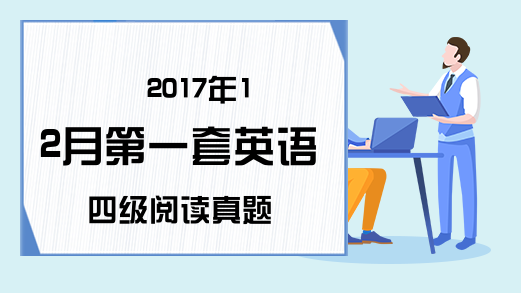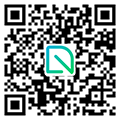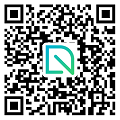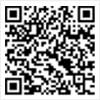2017年12月第一套英语四级阅读真题
【摘要】在英语四级考试中,考生在复习作文的时候可以运用历年真题来加快进度,那么今天青藤小编就来给大家说一说2017年12月第一套英语四级阅读真题及答案。希望能给各位考生带来帮助,祝愿各位考生都能取得满意的成绩。

一、2017年12月第一套英语四级阅读真题
Section A
Directions: In this section, there is a passage with ten blanks. You are required to select one word for each blank from a list of choices given in a word bank following the passage. Read the passage through carefully before making your choices. Each choice in the bank is identified by a letter. Please mark the corresponding letter for each item on Answer Sheet 2 with a single line through the centre. You may not use any of the words in the bank more than once.
A rat or pigeon might not be the obvious choice to tend to someone who is sick, but these creatures have some 26 skills that could help the treatment of human diseases.
Pigeons are often seen as dirty birds and an urban 27 , but they are just the latest in a long line of animals that have been found to have abilities to help humans. Despite having a brain no bigger than the 28 of your index finger, pigeons have a very impressive 29 memory. Recently it was shown that they could be trained to be as accurate as humans at detecting breast cancer in images.
Rats are often 30 with spreading disease rather than 31 it, but this long-tailed animal is highly 32 . Inside a rat's nose are up to 1,000 different types of olfactory receptors (嗅觉感受器), whereas humans only have 100 to 200 types. This gives rats the ability to detect 33 smells. As a result, some rats are being put to work to detect TB (肺结核). When the rats detect the smell, they stop and rub their legs to 34 a sample is infected.
Traditionally, a hundred samples would take lab technicians more than two days to 35 , but for a rat it takes less than 20 minutes. This rat detection method doesn't rely on specialist equipment. It is also more accurate—the rats are able to find more TB infections and, therefore, save more lives.
A) associated B) examine C) indicate D) nuisance E) peak F) preventing G) prohibiting H) sensitive I) slight J) specify K) superior L) suspicious M) tip N) treated O)visual
Section B
Directions: In this section, you are going to read a passage with ten statements attached to it. Each statement contains information given in one of the paragraphs. Identify the paragraph from which the information is derived. You may choose a paragraph more than once. Each paragraph is marked with a letter. Answer the questions by marking the corresponding letter on Answer Sheet 2.
Do In-Class Exams Make Students Study Harder?
Research suggests they may study more broadly for the unexpected rather than search for answers.
[A] I have always been a poor test-taker. So it may seem rather strange that I have returned to college to finish the degree I left undone some four decades ago. I am making my way through Columbia University, surrounded by students who quickly supply the verbal answer while I am still processing the question.
[B] Since there is no way for me to avoid exams, I am currently questioning what kind are the most taxing and ultimately beneficial. I have already sweated through numerous in-class midterms and finals, and now I have a professor who issues take-home ones. I was excited when I learned this, figuring I had a full week to do the research, read the texts, and write it all up. In fact, I was still rewriting my midterm the morning it was due. To say I had lost the thread is putting it mildly.
[C] As I was suffering through my week of anxiety, overthinking the material and guessing my grasp of it, I did some of my own polling among students and professors. David Eisenbach, who teaches a popular class on U.S. presidents at Columbia, prefers the in-class variety. He believes students ultimately learn more and encourages them to form study groups. "That way they socialize over history outside the class, which wouldn't happen without the pressure of an in-class exam," he explained, "Furthermore, in-class exams force students to learn how to perform under pressure, an essential work skill."
[D] He also says there is less chance of cheating with the in-class variety. In 2012, 125 students at Harvard were caught up in a scandal when it was discovered they had cheated on a take-home exam for a class entitled "Introduction To Congress." Some colleges have what they call an "honor code," though if you are smart enough to get into these schools, you are either smart enough to get around any codes or hopefully, too ethical to consider doing so. As I sat blocked and clueless for two solid days, I momentarily wondered if I couldn't just call an expert on the subject matter which I was tackling, or someone who took the class previously, to get me going.
[E] Following the Harvard scandal, Mary Miller, the former dean of students at Yale, made an impassioned appeal to her school's professors to refrain from take-hone exams. "Students risk health and well being, as well as performance in other end-of-term work, when faculty offers take-home exams without clear, time-limited boundaries," she told me. "Research now shows that regular quizzes, short essays, and other assignments over the course of a term better enhance learning and retention."
[F] Most college professors agree the kind of exam they choose largely depends on the subject. A quantitative-based one, for example, is unlikely to be sent home, where one could ask their older brothers and sisters to help. Vocational-type classes, such as computer science or journalism, on the other hand, are often more research-oriented and lend themselves to take-home testing. Chris Koch, who teaches "History of Broadcast Journalism" at Montgomery Community College in Rockville, Maryland, points out that reporting is about investigation rather than the memorization of minute details. "In my field, it's not what you know—it's what you know how to find out," says Koch. "There is way too much information, and more coming all the time, for anyone to remember. I want my students to search out the answers to questions by using all the resources available to them."
[G] Students' test-form preferences vary, too, often depending on the subject and course difficulty. "I prefer take-home essays because it is then really about the writing, so you have time to edit and do more research," says Elizabeth Dresser, a junior at Barnard. Then there is the stress factor. Francesca Haass, a senior at Middlebury, says, "I find the in-class ones are more stressful in the short term, but there is immediate relief as you swallow information like mad, and then you get to forget it all. Take-homes require thoughtful engagement which can lead to longer term stress as there is never a moment when the time is up." Meanwhile, Olivia Rubin, a sophomore at Emory, says she hardly even considers take-homes true exams. "If you understand the material and have the ability to articulate (说出) your thoughts, they should be a breeze."
[H] How students ultimately handle stress may depend on their personal test-taking abilities. There are people who always wait until the last minute, and make it much harder than it needs to be. And then there those who, not knowing what questions are coming at them, and having no resources to refer to, can freeze. And then there are we rare folks who fit both those descriptions.
[I] Yes, my advanced age must factor into the equation (等式), in part because of my inability to access the information as quickly. As another returning student at Columbia, Kate Marber, told me, "We are learning not only all this information, but essentially how to learn again. Our fellow students have just come out of high school. A lot has changed since we were last in school."
[J] If nothing else, the situation has given my college son and me something to share. When I asked his opinion on this matter, he responded, "I like in-class exams because the time is already reserved, as opposed to using my free time at home to work on a test," he responded. It seems to me that a compromise would be receiving the exam questions a day or two in advance, and then doing the actual test in class the ticking clock overhead.
[K] Better yet, how about what one Hunter College professor reportedly did recently for her final exam: She encouraged the class not to stress or even study, promising that, "It is going to be apiece of cake." When the students came in, sharpened pencils in hand, there was not a blue book in sight. Rather, they saw a large chocolate cake and they each were given a slice.
36. Elderly students find it hard to keep up with the rapid changes in education.
37. Some believe take-home exams may affect students' performance in other courses.
38. Certain professors believe in-class exams are ultimately more helpful to students.
39. In-class exams are believed to discourage cheating in exams.
40. The author was happy to learn she could do some exams at home.
41. Students who put off their work until the last moment often find the exams more difficult than they actually are.
42. Different students may prefer different types of exams.
43. Most professors agree whether to give an in-class or a take-home exam depends on type of course being taught.
44. The author dropped out of college some forty years ago.
45. Some students think take-home exams will eat up their free time.
Section C
Directions: There are 2 passages in this section. Each passage is followed by some questions or unfinished statements. For each of them there are four choices marked A), B), C) and D). You should decide on the best choice and mark the corresponding letter on Answer Sheet 2 with a single line through the centre.
Passage One
Questions 46 and 50 are based on the following passage.
That people often experience trouble sleeping in a different bed in unfamiliar surroundings is a phenomenon known as the "first-night" effect. If a person stays in the same room the following night they tend to sleep more soundly. Yuka Sasaki and her colleagues at Brown University set out to investigate the origins of this effect.
Dr. Sasaki knew the first-night effect probably has something to do with how humans evolved. The puzzle was what benefit would be gained from it when performance might be affected the following day. She also knew from previous work conducted on birds and dolphins that these animals put half of their brains to sleep at a time so that they can rest while remaining alert enough to avoid predators (捕食者). This led her to wonder if people might be doing the same thing. To take a closer look, her team studied 35 healthy people as they slept in the unfamiliar environment of the university's Department of Psychological Sciences. The participants each slept in the department for two nights and were carefully monitored with techniques that looked at the activity of their brains. Dr. Sasaki found, as expected, the participants slept less well on their first night than they did on their second, taking more than twice as long to fall asleep and sleeping less overall. During deep sleep, the participants' brains behaved in a similar manner seen in birds and dolphins. On the first night only, the left hemispheres (半球) of their brains did not sleep nearly as deeply as their right hemispheres did.
Curious if the left hemispheres were indeed remaining awake to process information detected in the surrounding environment, Dr. Sasaki re-ran the experiment while presenting the sleeping participants with a mix of regularly timed beeps (蜂鸣声) of the same tone and irregular beeps of a different tone during the night. She worked out that, if the left hemisphere was staying alert to keep guard in a strange environment, then it would react to the irregular beeps by stirring people from sleep and would ignore the regularly timed ones. This is precisely what she found.
46. What did researchers find puzzling about the first-night effect?
A) To what extent it can trouble people.
B) What role it has played in evolution.
C) What circumstances may trigger it.
D) In what way it can be beneficial.
47. What do we learn about Dr. Yuka Sasaki doing her research?
A) She found birds and dolphins remain alert while asleep.
B) She found birds and dolphins sleep in much the same way.
C) She got some idea from previous studies on birds and dolphins.
D) She conducted studies on birds' and dolphins' sleeping patterns.
48. What did Dr. Sasaki do when she first did her experiment?
A) She monitored the brain activity of participants sleeping in a new environment.
B) She recruited 35 participants from her Department of Psychological Sciences.
C) She studied the differences between the two sides of participants' brains.
D) She tested her findings about birds and dolphins on human subjects.
49. What did Dr. Sasaki do when re-running her experiment?
A) She analyzed the negative effect of irregular tones on brains.
B) She recorded participants' adaptation to changed environment.
C) She exposed her participants to two different stimuli.
D) She compared the responses of different participants.
50. What did Dr. Sasaki find about the participants in her experiment?
A) They tended to enjoy certain tones more than others.
B) They tended to perceive irregular beeps as a threat.
C) They felt sleepy when exposed to regular beeps.
D) They differed in their tolerance of irregular tones.
Passage Two
Questions 51 to 55 are based on the following passage.
It's time to reevaluate how women handle conflict at work. Being overworked or over-committed at home and on the job will not get you where you want to be in life. It will only slow you down and hinder your career goals.
Did you know women are more likely than men to feel exhausted? Nearly twice as many women than men ages 18-44 reported feeling "very tired" or "exhausted", according to a recent study.
This may not be surprising given that this is the age range when women have children. It's also the age range when many women are trying to balance careers and home. One reason women may feel exhausted is that they have a hard time saying "no." Women want to be able to do it all— volunteer for school parties or cook delicious meals—and so their answer to any request is often "Yes, I can."
Women struggle to say "no" in the workplace for similar reasons, including the desire to be liked by their colleagues. Unfortunately, this inability to say "no" may be hurting women's heath as well as their career.
At the workplace, men use conflict as a way to position themselves, while women often avoid conflict or strive to be the peacemaker, because they don't want to be viewed as aggressive or disruptive at work. For example, there's a problem that needs to be addressed immediately, resulting in a dispute over who should be the one to fix it. Men are more likely to face that dispute from the perspective of what benefits them most, whereas women may approach the same dispute from the perspective of what's the easiest and quickest way to resolve the problem—even if that means doing the boring work themselves.
This difference in handling conflict could be the deciding factor on who gets promoted to a leadership position and who does not. Leaders have to be able to delegate and manage resources wisely—including staff expertise. Shouldering more of the workload may not earn you that promotion. Instead, it may highlight your inability to delegate effectively.
51. What does the author say is the problem with women?
A) They are often unclear about the career goals to reach.
B) They are usually more committed at home than on the job.
C) They tend to be over-optimistic about how far they could go.
D) They tend to push themselves beyond the limits of their ability.
52. Why do working women of child-bearing age tend to feel drained of energy?
A) They struggle to satisfy the demands of both work and home.
B) They are too devoted to work and unable to relax as a result.
C) They do their best to cooperate with their workmates.
D) They are obliged to take up too many responsibilities.
53. What may hinder the future prospects of career women?
A) Their unwillingness to say "no".
B) Their desire to be considered powerful.
C) An underestimate of their own ability.
D) A lack of courage to face challenges.
54. Men and woman differ in their approach to resolving workplace conflicts in that ______.
A) women tend to be easily satisfied
B) men are generally more persuasive
C) men tend to put their personal interests first
D) women are much more ready to compromise
55. What is important to a good leader?
A) A dominant personality.
B) The ability to delegate.
C) The courage to admit failure.
D) A strong sense of responsibility.
二、2017年12月第一套英语四级阅读真题答案
26-35:KDMOA FHICB
36-45:IECDB HGFAJ
46-55:DCACB DAACB
2017年12月第一套英语四级阅读真题小编就说到这里了,更多关于大学英语四级考试的备考技巧,备考干货,新闻资讯,成绩查询,准考证打印入口,准考证打印时间等内容,小编会持续更新。祝愿各位考生都能认真备考,顺利通过考试。
大学生考试申请领取


环球青藤
官方QQ群扫描上方二维码或点击一键加群,免费领取大礼包,加群暗号:青藤。 一键加群


刷题看课 APP下载
免费直播 一键购课
代报名等人工服务












